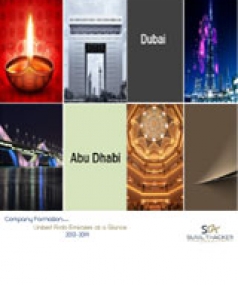Dubai Media City Freezone
 1. What law established this freezone?
1. What law established this freezone?
This freezone was established by Dubai Law No. 1/2000 issued on 29 January 2000.
2. What are the main internal regulations governing this freezone?
The regulations governing the Dubai Creative Clusters (DCC) were the Dubai Technology and Media Free Zone Companies Regulations 2003.
In 2016, the Dubai Creative Clusters Private Companies Regulations were issued to replace the 2003 Regulations.
3. Does this freezone have any reciprocal arrangements with other freezones?
There are presently no arrangements between this freezone and other freezone areas. However, it is now much easier to transfer a visa to and from the Dubai Multi Commodities Centre.
4. What are the key areas of UAE and Emirate legislation businesses operating in this freezone must still comply with? What are the most important examples of how this impacts operations?
DCC regulations and laws govern DCC companies, but when these laws and regulations are silent, Federal Law No. 2/2015, The UAE Commercial Company Law, will apply. Other laws the DCC needs to comply with includes Federal Law No. 11/1992, the UAE Commercial Transactions Law, and Federal Law No.18/1993, The UAE Civil Procedure Code.
5. What are the key UAE and Emirate onshore agencies a business operating in this freezone would need to register or comply with?
For legal and administrative transactions and procedures, including issues relating to visas and immigration, DCC companies will usually directly deal with the DCC Authorities.
6. How does a company set up in this freezone?
Initially, there is a pre-approval required where the business proposal will be reviewed, including the business's documentation and details of the shareholders and other departments. When granted pre-approval, a lease agreement for business premises will be entered into.
The DCC legal and financial department will then review the documentation for final approval. An invoice will then be issued by the DCC for the registration and licensing of the entity which will include the office rent. The license will be granted only once the invoice has cleared and receipt of the entire share capital is received (in the case of limited liability companies).
The documentation required to register a company within the free zone includes: details and passport copies of the shareholder, manager, and director, the company incorporation certificate, the business plan, a NOC, MAA, share capital proof, resolution for incorporation, and bank reference letter.
7. What features do companies set up in this freezone have?
Foreign investors usually adopt a business establishment by opening a branch office or incorporating a limited liability company as the business can be 100% foreign owned, therefore the company can take full control of the business as there is not the UAE sponsor requirement. The DDC is known for its excellent location and strong legal framework. Additionally, the free zone is appealing as it offers 100% repatriation of capital and profits and is exempt from corporate tax and customs duty.
8. What can companies set up in this freezone do?
The types of businesses permitted to operate within the freezone are divided into four categories: Information and communication technology (ICT), education, science and media. These are further sub-divided into:
- ITC Cluster: Dubai Outsource Zone and Dubai Internet City
- Media Cluster: Dubai Media City, International Production Zone and Dubai Studio City
- Education Cluster: Dubai International Academy City and Dubai Knowledge Village.
- Science: Dubiotech and Embark, Healthcare City.
9. What can companies set up in this freezone not do?
All entities carrying out business in the DCC should hold a license of authorisation and function as per the license.
10. What types of business are allowed to operate in this freezone?
A limited liability company, a branch office of a foreign company, or a branch office of a UAE company and freelancing.
11. What inheritance laws apply in this freezone?
The laws of the UAE govern the DCC. The Shari'a principle of inheritance will apply to Muslim individuals and the heir to the estate of a non-Muslim can request the court to enforce the laws of succession of the deceased's home country. The Court can also apply Shari'a to non-Muslims.
12. What taxation applies?
Under Article 17 of Dubai Law No. 15/2014, all legal entities registered in the DCC are exempt from all taxes including income tax. There is no record kept of the transfer of capital, profits earnt and wages. The DCC also offers a fifty year tax holiday even if a new tax is introduced onshore.
13. What accounting and auditing rules apply to businesses operating in this freezone?
All legal entities operating in the DCC should have updated account and finance records. For a limited liable company, accounts should be audited by an accounting firm which is duly licensed and authorised under Dubai laws.
14. Where do businesses operating in this freezone generally locate their bank accounts?
A business functioning in the DCC locates their bank account in the Emirate of Dubai.
15. Are there any specific rules governing when moveable property in removed from the freezone area or transferred into the freezone area from another jurisdiction?
The transfer and movement of any goods is governed by Dubai Customs.
16. Are any specific licenses required to operate as a specific type of company in this freezone?
The license type will depend on the business activity applied for. For an onshore limited liability company, there might be a requirement to open a branch office.
17. Is there any specific ongoing regulation or monitoring of firms operating as particular types of company by this freezone authority?
There may be specific permissions required from the federal or local authorities. For instance, a restaurant will need approval from the Dubai Municipality Dubai Control.
18. How are disputes settled with companies in this freezone?
Disputes arising in this freezone are dealt with by the Courts of Dubai. Unless there is an agreement between both parties to resolve the dispute via an alternative method such as arbitration.
19. How are disputes between onshore companies and companies in this freezone settled?
Disputes arising in this freezone are dealt with by the Courts of Dubai. Unless there is an agreement between both parties to resolve the dispute via an alternative method such as arbitration.
20. What are the main rights and duties of an employer and employee working in this freezone?
 The DCC has its own set of rules governing the relationship between an employer and employees, supplementary to UAE labour laws. Federal Law No. 8/1980, The UAE Labour Law, is the main piece of legislation with regulations for the functioning of employment rights and relationships in the DCC. Federal Law No. 8/1980, The UAE Labour Law, compels an employer to enter into a contract with an employee. The employment contract will contain the details of work, such as working hours, wages, the type of work, allowances, leave, salary, etc. The employer is obliged to meet the minimum requirements for pay, working hours, wages, allowances, etc. In return, the employee is required to work and carry out his duties under the contract and as requested by the employer.
The DCC has its own set of rules governing the relationship between an employer and employees, supplementary to UAE labour laws. Federal Law No. 8/1980, The UAE Labour Law, is the main piece of legislation with regulations for the functioning of employment rights and relationships in the DCC. Federal Law No. 8/1980, The UAE Labour Law, compels an employer to enter into a contract with an employee. The employment contract will contain the details of work, such as working hours, wages, the type of work, allowances, leave, salary, etc. The employer is obliged to meet the minimum requirements for pay, working hours, wages, allowances, etc. In return, the employee is required to work and carry out his duties under the contract and as requested by the employer.
21. How are employment disputes between employers and employees working in this freezone settled?
Disputes arising between employers and employees are usually handled by an expert team of DCC mediators. However, the DCC does not hold itself responsible for any resolution that takes place between the parties. If DCC mediators are not successful in resolving a dispute, they will issue the claimant with a letter to refer the matter to the labour court.
22. What entry qualifications and permits are required for staff working in this freezone?
In most cases, employers will assist their employees in obtaining the required permits to work in the DCC. If the employee is an expatriate, the employee will need to be sponsored to work in the freezone legally. The employer will need to enter into a personal secondary agreement with the DCC, after which, the DCC will sponsor the employer's staff on his behalf. Employees who are not sponsored by the DCC require an employment visa sponsored by the DCC and a DCC ID card to legally work in the freezone.
23. How are staff working within this freezone registered with the authorities?
The standard application form and fees for each application have to be complied with by the employer. After receiving a permit to enter, the applicant undertakes a medical test and a medical certificate will be issued. An application then has to be made for a residence visa which is attached to the employee's passport allowing the employee to reside and work in the DCC legally.
24. What rules govern the remuneration and minimum benefits of staff working in this freezone?
There is no mandatory remuneration or benefits the employer has to provide his employees with. However, it is common practice for employers to provide their staff with at least the minimum wage and allowances for housing and transportation. If the employee is terminated, then the employer should make provisions for the employee to return to his home country, except if the employee is moving to a new employer in the UAE. DCC rules and Federal Law No. 8/1980, The UAE Labour Law, state that the employer must arrange for a medical card and all other necessary costs.
25. What rules govern the working time and leave of staff working in this freezone?
Under Federal Law No. 8/1980, The UAE Labour Law, working hours should not exceed 48 in a week (40 hours if a 5-day working week) and 8 in a day (except in the case of industries with the required permission from the authorities). An employer must allow his staff to take an hour break for food, rest, and prayers after every five working hours. Working hours should be flexible and adhere to Ramadan and summer working hours for certain industries. Pregnant women are entitled to 45 days paid leave, and half paid leave if service is less than one year. There is a further allowance of 100 days unpaid in the case of sickness due to pregnancy.
After one year of service, employees are entitled to 30 days leave annually. After six months in the first year, an employee is entitled to two days annual leave per month. All employees are entitled to 90 days sick leave per year of which 15 days are fully paid leave and 30 days half paid.
26. What are the main features of a property lease in this freezone?
There are a variety of rental spaces made available by the DCC such as office space, retail space, etc. A lease can be for a single unit or multiple stories. The activity of the company will play a role in the type of property available.
27. Is it possible to apply for a building permit in this freezone? How is this done and what steps are required?
To obtain a building permit in this freezone, the application should have specific documentation such as; building permit request form, valid site plan; project HSC plan( should be signed and stamped by the company manager); copy of the project manager and team HSC passports; copy of the final design letter; project detail sheet( stamped and signed by a consultant);
security cheque; NOC from the master developer and fees of AED 1.00 per square feet ( Minimum AED 9,000).
28. What environmental requirements must construction companies building in this freezone consider, e.g. form of building, landscaping or building height?
Any contracting company in Dubai must comply with the regulations set by the Environmental, Safety and Health Department in the Dubai Municipality.
29. What are the key restrictions when leasing a property in this freezone?
Any legal entity operating in the DCC will have an office based in the DCC. For a lease agreement, approval from the DCC is mandatory to maintain a license. An office can be rented from the DCC or a private landlord. However, market rates are not applicable and are set by the DCC authorities.
 30. What are the rules governing the use of utilities in this freezone?
30. What are the rules governing the use of utilities in this freezone?
The Dubai Electricity and Water Authority and the DU are the service providers in the DCC. Applicable charges are levied for use.
31. How do retail premises establish themselves in this freezone?
Retailers can establish themselves in this freezone subject to an allowance from the DCC authorities.
32. Is it possible for hotels to operate in this freezone - how do they establish themselves?
Hotels can operate and establish themselves in this freezone, provided they obtain the necessary permissions from the DCC
(special approvals will be required).
Originally published on LexisNexis
 English
English
 عربي
عربي Русский
Русский 官话
官话 português
português
 Türk
Türk 
































